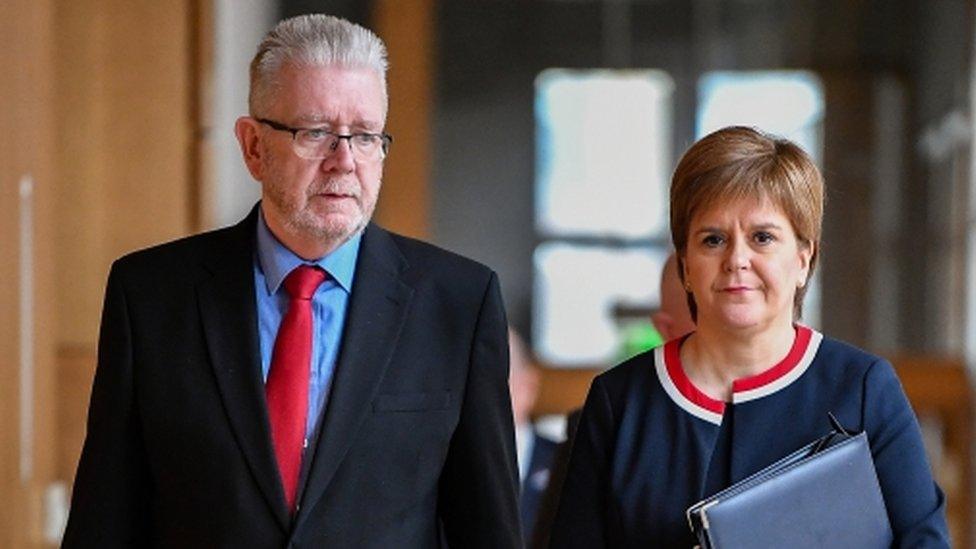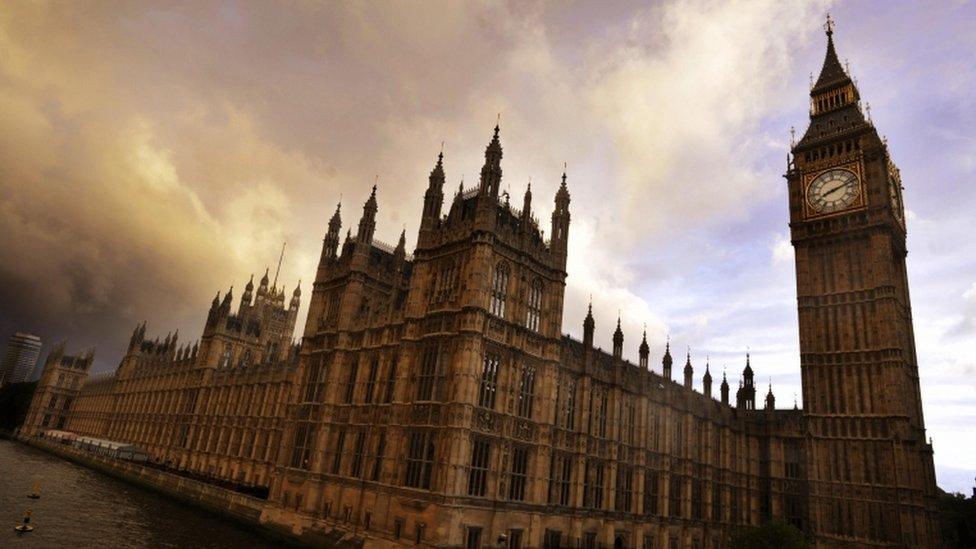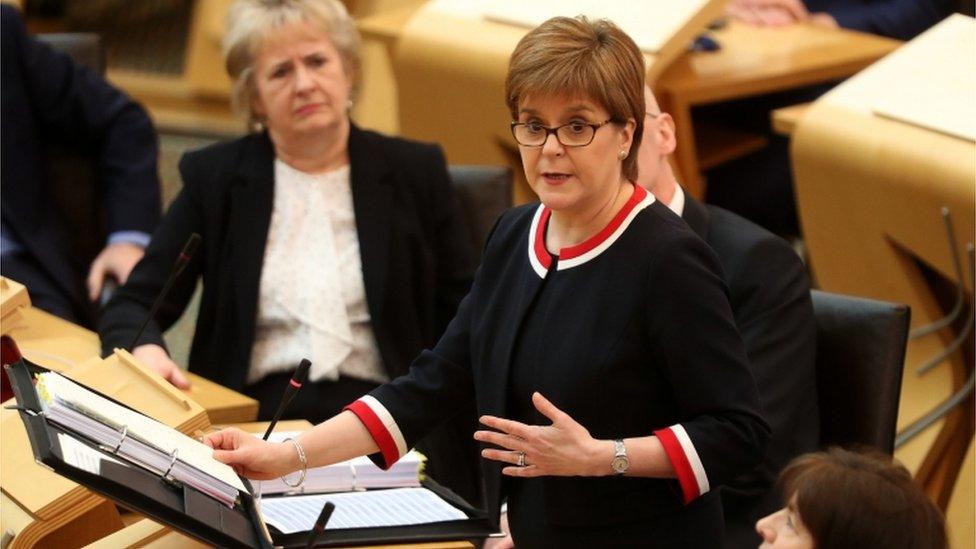Brexit: Mike Russell raises constitutional conundrums at Holyrood
- Published

Mr Russell was appearing before a Holyrood committee as Ms Sturgeon travelled to London for talks with the PM
Fancy a bout of constitutional wrangling? No, not Brexit, for once. But its aftermath, if such a bizarre, outré concept can be envisaged.
Mike Russell, Scotland's Minister for Mitigating Brexit, gently floated the notion at a session of Holyrood's finance committee this morning.
The convener's eyes instantly flamed with fascination. But then it was Adam Tomkins in the chair - and he was formerly a professor of constitutional law. So he can be forgiven his fervour.
And the notion? That Brexit has exposed a fundamental flaw in the current constitutional set-up of the devolved UK. Affecting, in Mr Russell's repeated phrase, the four countries of these islands.
In essence, Mr Russell was offering a theoretical and philosophical counterpoint to the problem which has confronted Nicola Sturgeon in London today.
The offer of Brexit talks from the Prime Minister was initially directed solely at the Leader of the Opposition, Jeremy Corbyn. Ms Sturgeon is now to have a meeting with the PM, but only as an afterthought.
From a Number 10 perspective, one can understand the thinking, to some extent. Theresa May does not need dialogue. She does not need solace (or, rather, she does, but not from opposition leaders.) She needs votes. Votes in the Commons.
For more than two years, she expected those votes to come from her own backbenchers and from her costly chums in the DUP.
She has now, apparently, concluded that that strategy has comprehensively failed. And so she seeks to replicate 1973 when Britain joined the Common Market partly as a consequence of cross-party co-operation between sectors of the Conservative and Labour parties.
What would a no-deal Brexit mean for your summer holiday?
Her pitch to Jeremy Corbyn is not because she likes his beard or hopes to prevent him being used as target practice. This is a question of arithmetic. She needs enough votes to replace the Salons des Refusés behind her and from Northern Ireland.
Without the official opposition, she doesn't have a hope of winning in the Commons. Hence the pitch to Jeremy Corbyn. Hence the temporary side-lining of Nicola Sturgeon.
But, in a thoughtful section at the close of his evidence today, Mike Russell argued that Scotland is side-lined more generally within a system where Westminster is supreme.
You will recall Enoch Powell's dictum that "power devolved is power retained". (Incidentally, were he still alive, he would currently have substantial new material to exemplify his other comment, to the effect that all political careers end in failure. But no matter.)
Powell was, in sum, anticipating today's constitutional fact that Westminster remains sovereign, whatever is set out in the Scotland Act 1998.

Westminster can legislate as it chooses. The Sewel Convention is just that - a Convention. It is not, as the Supreme Court reminded us, justiciable. Westminster could even abolish the Scottish Parliament, although politically that is presently unthinkable.
But Mr Russell's pitch was more subtle. He argued that the discussions and negotiations over Brexit had exposed a fundamental, intrinsic problem.
Scotland, he said, had been repeatedly and systematically ignored, despite having devolved responsibility for issues potentially affected by Brexit, such as the health service and aspects of the economy.
Disputes, he averred, were simply brushed aside by Westminster and Whitehall, leaving Scottish Ministers thwarted and frustrated.
What was needed was a justiciable system for dealing with such disputes, as existed between the member states of the European Union.
Such a system, however, was simply not feasible in the UK, given the fact of Westminster sovereignty. As things stood, there was only one conceivable winner, as the dispute over powers returning from the EU had amply demonstrated.
Mr Russell added that this matter was due to be discussed by an Inter Governmental Review. Although he noted, wryly and accurately, that it was unlikely to command much attention during the present crisis.
Constitutional niceties
With regard to that crisis, Mr Russell offered a few thoughts, although he repeatedly declined to characterise any of his preferences as a "red line" policy. Such dogmatism, he argued, was what had caused the problem in the first place.
As a starting point, Mr Russell said he would prefer…..a different starting point. He decried Brexit in all its forms, suggesting it might usefully be dumped by revoking Article 50.
Questioned on the constitutional niceties of that by the eager Mr Tomkins, Mr Russell wisely and elegantly stepped to one side, arguing that political will, if it were there, would circumvent the constitution.
Urged by successive MSPs to state his readiness to compromise, Mr Russell argued that the Scottish government and the SNP had already compromised by being prepared to listen to terms for departure from the EU.
Still, he would want freedom of movement for labour to be enshrined in any deal. That would require a settlement beyond a mere customs union, as in the Ken Clarke amendment. Common Market 2.0, as advanced by Nick Boles, came closer and the SNP had moved in that direction after initial scepticism.
But the biggie? That was for a further referendum, a People's Vote. Strictly, the motion before the Commons only presages a confirmatory ballot on the PM's deal.
Mr Russell said it would have to include Remain as an option - and such a referendum was "absolutely essential".
Except that, when pressed further, he expressed reluctance to be prescriptive about anything, even a referendum.
Truly, troubled times.
- Published28 March 2019
